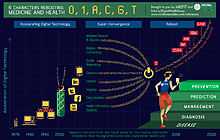Digital health
Digital health is the convergence of the digital and genetics revolutions with health, healthcare, living, and society. The benefits of digital health include the empowerment of consumers to better track, manage, and improve their own and their family’s health. In healthcare, digital technology is also helping to reduce inefficiencies in delivery, improve access, reduce costs, increase quality, and make medicine more personalized and precise.
Venture investment in digital health in 2014 reached $4.1 billion, a 125% increase year-over-year.[1] Remarkably, aggregate investing in digital health surpassed that in traditional healthcare and medical devices for the same time period.[2]
Elements
While the Digital Revolution is characterized by "the mass production and widespread use of digital logic circuits, and its derived technologies, including the computer, digital cellular phone, and fax machine", the key elements of digital health are largely enumerated by Dr. Eric Topol in his book "The Creative Destruction of Medicine: How the Digital Revolution Will Create Better Health Care".[3] According to Topol, there are several super-convergence elements comprising digital health. The infographic at right depicts the increasing health benefits of digital health and is based upon Dr. Topol's concepts.

The essential elements of the digital health revolution include wireless devices, hardware sensors and software sensing technologies, microprocessors and integrated circuits, the Internet, social networking, mobile/cellular networks and body area networks, Health IT (aka health information technology), genomics, and personal genetic information.
The lexicon of Digital Health is extensive and includes all or elements of mHealth (aka mobile health), Wireless Health, Health 2.0, eHealth, e-Patient(s), Healthcare IT / Health IT (information technology), Big Data, Health Data, Cloud Computing, Quantified Self, Wearable Computing, Gamification, Telehealth / Telemedicine, Precision Medicine and Personalized Medicine, plus Connected Health.[4]
Genomics and Genetics
According to J. Craig Venter, we are basically DNA-driven software devices and there is no difference between digital code and genetic code.[5] Digital code is a binary code: 0, 1. Genetic code is a four-base code: A, C, G, T.[6] "We can convert between the two as well as digitize man, as Dr. Topol describes it in expanded terms."[6]
References
- ↑ "Health care start-ups rake in record money in 2014".
- ↑ "Venture Investment in Digital Health Surpasses Medical Devices".
- ↑ Topol, Eric. The creative destruction of medicine : how the digital revolution will create better health care. New York: Basic Books. ISBN 978-0465025503.
- ↑ "What is Digital Health?".
- ↑ Venter, J. Craig. "J. CRAIG VENTER: THE BIOLOGICAL-DIGITAL CONVERTER, OR, BIOLOGY AT THE SPEED OF LIGHT @ THE EDGE DINNER IN TURIN". Retrieved 21 January 2013.
- ↑ 6.0 6.1 Sonnier, Paul. "My 2012 Digital Health Awards: Company, Person, Book, Journalist of the Year". Retrieved 21 January 2013.